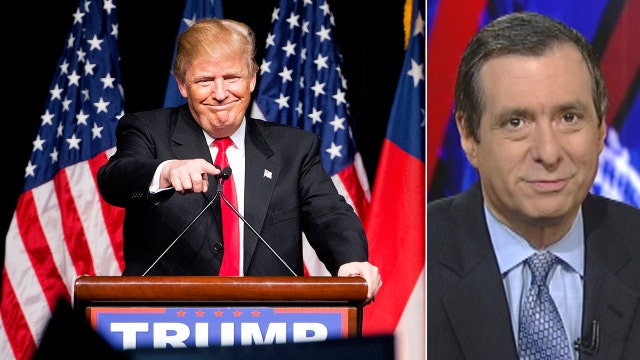Kurtz: The Right vs. The Donald
'MediaBuzz' host reacts to coverage of Donald Trump's wide lead in Republican presidential race
It’s no secret that many big-time conservative commentators are deeply and passionately opposed to Donald Trump.
So what will they do if he winds up as the GOP nominee?
In many cases, the vitriol has been so intense that it’s impossible to imagine them reluctantly siding with Trump. But it’s just as hard to imagine them getting behind Hillary Clinton. Which would leave them in quite a box, and possibly diminish them a force—while robbing Trump of the intellectual support that a Republican candidate usually draws from the right.
It was in December that Bill Kristol, editor of the Weekly Standard and a fierce Trump critic, made noises about abandoning his longtime party. “Crowd-sourcing: Name of the new party we’ll have to start if Trump wins the GOP nomination?” he tweeted.
Kristol writes this week: “Choosing Donald Trump as the Republican party's nominee would be a mistake. He lacks the character to be a trustworthy president and the convictions to be a conservative one.”
Erick Erickson, the Red State founder who now has a new site, threw down the gauntlet the other day:
“It is amazing how many television personalities have compromised their convictions for a discounted stay at Mara Lago. Donald Trump requires compromises of conviction that I in good conscience cannot and will not make.
“I have become convinced that Donald Trump’s pro-life conversion is a conversion of convenience. Life is the foremost cause in how I vote. Therefore I will not be voting for Donald Trump at all. Ever.
“A lot of Republicans are going to start making claims that we must rally to the nominee, no matter who he is. I know for certain a large number of Trump supporters will not rally to a Cuban. I will not rally to Trump. Frankly, if Trump is able to get the nomination, the Republican Party will cease to be the party in which I served as an elected official. It will not deserve my support and will not get it if it chooses to nominate a pro-abortion liberal masquerading as a conservative, who preys on nationalistic, tribal tendencies and has an army of white supremacists online as his loudest cheerleaders.”
Whether Erickson is right or wrong about Trump’s pro-life convictions, it’s clear he’s not going to remain quiet.
George Will, the syndicated columnist and Fox News contributor, renewed his assault on Trump by quoting President Obama’s line that the billionaire says what his GOP rivals say, only more colorfully:
“Trump was not saying ‘what the other candidates are saying’ when last week he said: ‘Every single other [Republican] candidate is going to cut the hell out of your Social Security.’ Trump so relishes causing Republican wreckage that he went on to attack House Speaker Paul Ryan. Recalling the Democrats’ 2011 ad depicting a Ryan-like figure pushing an elderly woman in a wheelchair off a cliff, Trump suggested that the ad was fair commentary on Ryan’s proposed entitlement reforms. Trump’s plan for reforming entitlements probably is to get Mexico to pay for them, after it finances The Wall.
“Many South Carolina Evangelicals, like those in Iowa, showed, shall we say, Christian forgiveness toward Trump, who boasts of his sexual athleticism, embraces torture, and promises to kill terrorists’ families. Or perhaps these remarkable Evangelicals think his myriad conversions-of-convenience (his serial adjustments of his ‘convictions’ in time for this campaign) constitute being ‘born again.’ This is an interesting interpretation of John 3:7.”
I don’t see Will changing his tune in the interests of party unity. The same goes for Rich Lowry, editor of National Review, who devoted an entire issue, with 22 contributing conservatives, to attacking Trump.
Most of these columnists and commentators are loyal to their vision of conservatism, not the Republican Party. And they see Trump as a threat to that movement.
You also have foreign policy voices like Max Boot, writing in Commentary:
“Donald Trump, the undoubted Republican front-runner after winning the New Hampshire and South Carolina primaries, is — there is no way to sugarcoat this — a liar, an ignoramus, and a moral abomination.”
Now it’s hardly uncommon for pundits to bash a primary candidate and make peace with him later on. Mitt Romney generated little enthusiasm among the conservative commentariat, but despite the early criticism, most of its members concluded the former governor was preferable to a second Obama term. A similar dynamic played out four years earlier when John McCain won the nomination.
But Trump is different. There is something visceral about the conservative opposition to him. And he runs hard against his journalistic detractors, repeatedly calling them out by name.
Would it matter? Trump’s appeal is such that doesn’t need the op-ed warriors. But their opposition, or silence, wouldn’t help in an environment where liberal commentators are making the case for Hillary.













































